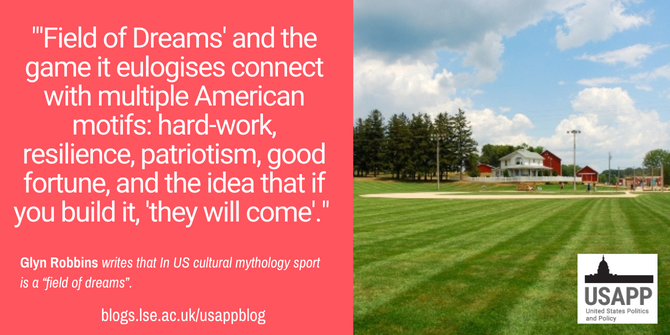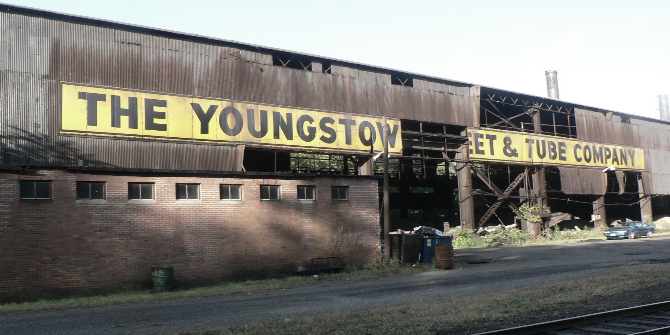 Following the murder of George Floyd in 2020, American sport was once again the site of reaction and protest. Glyn Robbins takes an outsider’s view of the US’ relationship with baseball, basketball, and American football, writing that while such games evoke the American Dream of eternal hope through striving for success, they are also entwined with politics, both activist and progressive, and colonialist and reactionary.
Following the murder of George Floyd in 2020, American sport was once again the site of reaction and protest. Glyn Robbins takes an outsider’s view of the US’ relationship with baseball, basketball, and American football, writing that while such games evoke the American Dream of eternal hope through striving for success, they are also entwined with politics, both activist and progressive, and colonialist and reactionary.
While living in the US last year, I witnessed an extraordinary exercise in American cultural pageantry. From my apartment in the Bronx, on the 12th of August 2021, I watched a nationally televised baseball game between my local team, the New York Yankees and the Chicago White Sox. Nothing particularly unusual about that, except that the game was played adjacent to corn fields in Dyersville, Iowa (population 4,058).
If that apparently incongruous setting sounds familiar, it’s probably because you’ve seen “Field of Dreams”, the 1989 film that celebrated the deep and enduring place of baseball in US society. Major League Baseball (MLB), the corporation that oversees the $10 billion a season “national pastime”, decided to connect with some of America’s deepest mythologies and stage a game in the fabled American heartland so often invoked by US politicians.
This produced a disorientating blurring of fact and fiction. As the camera lovingly panned around farmhouses and grain-elevators and after Kevin Costner (the star of the film) had thrown the ceremonial first pitch, the match commentators repeatedly quoted the movie: “Is this heaven? No, it’s Iowa”.
If you build it, they will come
“Field of Dreams” and the game it eulogises connect with multiple American motifs: hard-work, resilience, patriotism, good fortune, and the idea that if you build it, “they will come”. The movie title, of course, echoes probably the nation’s biggest ideological construct, for which baseball is the perfect analogy. It’s often described as a “game of failure”. Hitters, for example, are considered great if they connect with the ball more than three times in ten during their career. Even the best teams don’t usually win more than 60 percent of their games. But the eternal hope of striving for success captures the American Dream.

“Field of Dreams” (CC BY-NC-SA 2.0) by karma17
Baseball assumed its national prominence in the mid-19th century because its rival, cricket, was associated with the former colonial power of the UK, and its development has closely mirrored the country’s history. After the Civil War, baseball was seen as a unifying agent and the game boomed with the nation’s exploding 20th century industrial economy, despite suffering its greatest scandal in 1919 amidst accusations of match-fixing. Until the post-Second World War period, black and Latino players competed in segregated leagues. Even today, there are on-going controversies about the appropriation and misuse of the Native-American experience. Only this season has Cleveland’s baseball team changed its name from the “Indians” to the Guardians, but the Atlanta Braves still use the tomahawk chop as its rallying chant, which President Trump was seen enthusiastically joining-in with last year.
Despite its early identification with national independence, today baseball is also redolent of US colonialism. About a quarter of MLB players are from Latin-American countries, where the slim chance of making it as a professional represents a possibility of escape from impoverished economies dominated by US corporate interests. This exploitative nexus is reflected in a farming system for potential players operated by the MLB teams. Another baseball film, “Sugar” (2008). depicts the raised hopes and ultimate rejection of a player from the Dominican Republic who spends most of his time in the minor leagues that feed MLB, where conditions are so bad that last season, some of the game’s big stars supported a campaign demanding fairer treatment.
Progressive and reactionary politics through American sports
But baseball isn’t the only US sport closely entwined with politics. Basketball sometimes sounds far more like the voice of contemporary urban America than mainstream politicians. Three-quarters of players in the National Basketball Association (NBA) are African American, so it is probably not surprising that, in 2020, several games were postponed because players refused to take the court in an act of solidarity with the Black Lives Matter movement in the wake of the murder of George Floyd. With the possible exception of Mohammed Ali refusing the draft during the Vietnam War, this was the most vivid demonstration of sporting political protest since athletes John Carlos and Tommie Smith raised the Black Power salute at the 1968 Olympics. More recently, Steve Kerr, coach of the NBA’s Golden State Warriors, spoke out vociferously in support of gun control, following the Uvalde massacre.
By contrast, American football has been associated with some of the country’s more reactionary aspects. With its emphasis on – and celebration of – strategic, brutal, physical conflict, the game can appear to be a metaphor for US militarism and violence. But this is nothing new. In 1971, Dave Meggyesy, a player with the St Louis Cardinals, wrote “Out of Their League”, a book about his experiences in the National Football League (NFL). Meggyesy identified the link between the ideological place of American football with attempts to justify the Vietnam War and other features of US capitalism. He reflected, in a statement that still resonates: “Football is an attempt to sell a blown out, smacked out people, fighting inflation, the exploitation of their work, of the earth, that our system is still totally economically and politically viable”.
However, the symbolic gesture of “taking the knee” was inspired by an NFL player, Colin Kaepernick, to draw attention to racist injustice and the killing of black people by the police. While some argue politics should be separated from sport, others maintain that sport has the potential to unify and change the political climate. Taking the knee is a good example of the latter. When Kaepernick and some of his fellow-players started kneeling, instead of standing, during the national anthem (which is played before most US sports games, at every level), he was condemned for being unpatriotic. A very similar reaction initially met the England football/soccer team when they followed Kaepernick’s example. But like him, they refused to backdown and their determination has brought an almost complete turnaround in how the act of solidarity is received in the UK. Where once it was met with boos, it is now routinely applauded.Bill Russell, the great Boston Celtics basketball player, and civil rights activist, who died on 31st July, subverted some of the nationalistic meanings of US sport, while expressing his solidarity with those protesting against institutional racism. In 2017, Russell “took the knee”, while wearing his Presidential Medal of Freedom.
Proud to take a knee, and to stand tall against social injustice." #takeaknee #medaloffreedom #NFL #BillRussell #MSNBC pic.twitter.com/1MhinoAcW7
— TheBillRussell (@RealBillRussell) September 25, 2017
Another MLB “Field of Dreams” game is scheduled for the 11th of August and is likely to conjure the same mix of sentimental, optimistic stories that are a feature of American society, with the film script again capturing the essence of the nation’s creation myth:
“The one constant through all the years has been baseball. America has rolled by like an army of steamrollers. It’s been erased like a blackboard, rebuilt and erased again. But baseball has marked the time. This field, this game, is a part of our past. It reminds us of all that once was good, and that could be again”.
Please read our comments policy before commenting.
Note: This review gives the views of the author, and not the position of USAPP– American Politics and Policy, nor of the London School of Economics.
Shortened URL for this post: https://bit.ly/3BTsuFd
About the author
 Glyn Robbins
Glyn Robbins
Glyn Robbins was born in London and has worked in housing since 1991, when he was a student of Professor Anne Power on the LSE’s housing Masters course. In 2013 he completed a Ph.D in planning and urban policy. Since 2017, he has helped support students on the LSE’s Cities Programme and became an LSE Visiting Fellow in 2019 and a Fulbright Scholar in 2020/21. He also manages a north London council estate. Glyn’s writing about housing and urban policy has been widely published and he has frequently been interviewed by the media on the subject. In addition to his professional and academic involvement, Glyn is a long-time housing campaigner.





Why is AIR sports so closely associated with politics?